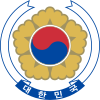
Back سياسة كوريا الجنوبية Arabic Държавно устройство на Южна Корея Bulgarian Política de Corea del Sur Spanish سیاست در کره جنوبی Persian Politique en Corée du Sud French Politik Korea Selatan ID Politica della Corea del Sud Italian 大韓民国の政治 Japanese 대한민국의 정치 Korean Pietų Korėjos politinė sistema Lithuanian
This article needs additional citations for verification. (April 2014) |
Politics of the Republic of Korea 대한민국의 정치 (Korean) | |
|---|---|
 | |
| Polity type | Unitary presidential constitutional republic |
| Constitution | Constitution of the Republic of Korea |
| Legislative branch | |
| Name | National Assembly |
| Type | Unicameral |
| Meeting place | National Assembly Building |
| Presiding officer | Kim Jin-pyo, Speaker of the National Assembly |
| Executive branch | |
| Head of State and Government | |
| Title | President |
| Currently | Yoon Suk Yeol |
| Appointer | Direct popular vote |
| Cabinet | |
| Name | State Council |
| Leader | President |
| Deputy leader | Prime Minister |
| Appointer | President |
| Headquarters | Yongsan, Seoul |
| Ministries | 18 |
| Judicial branch | |
| Name | Judiciary of South Korea |
| Supreme Court | |
| Chief judge | Cho Hee-dae |
| Constitutional Court | |
| Chief judge | Lee Jongseok |

 |
|---|
|
|
The politics of South Korea take place in the framework of a presidential representative democratic republic, whereby the president is the head of state, and of a multi-party system. To ensure a separation of powers, the Republic of Korea Government is made up of three branches: legislative, executive, and judicial. The government exercises executive power and legislative power is vested in both the government and the National Assembly. The judiciary is independent of the executive and the legislature and comprises a Supreme Court, appellate courts, and a Constitutional Court.
Since 1948, the constitution has undergone five major revisions, each signifying a new republic. The current Sixth Republic began with the last major constitutional revision that took effect in 1988. From its founding until the June Democratic Struggle, the South Korean political system operated under a military authoritarian regime, with the freedom of assembly, association, expression, press and religion as well as civil society activism being tightly restricted. During that period, there were no freely elected national leaders, political opposition is suppressed, dissent was not permitted and civil rights were curtailed.
The Economist Intelligence Unit rated South Korea a "full democracy" in 2022.[1] According to the V-Dem Democracy indices South Korea was 2023 the third most electoral democratic country in Asia.[2]
- ^ "Democracy Index 2022: Frontline democracy and the battle for Ukraine" (PDF). Economist Intelligence Unit. 2023. Retrieved 2023-02-09.
- ^ V-Dem Institute (2023). "The V-Dem Dataset". Archived from the original on 8 December 2022. Retrieved 14 October 2023.
© MMXXIII Rich X Search. We shall prevail. All rights reserved. Rich X Search